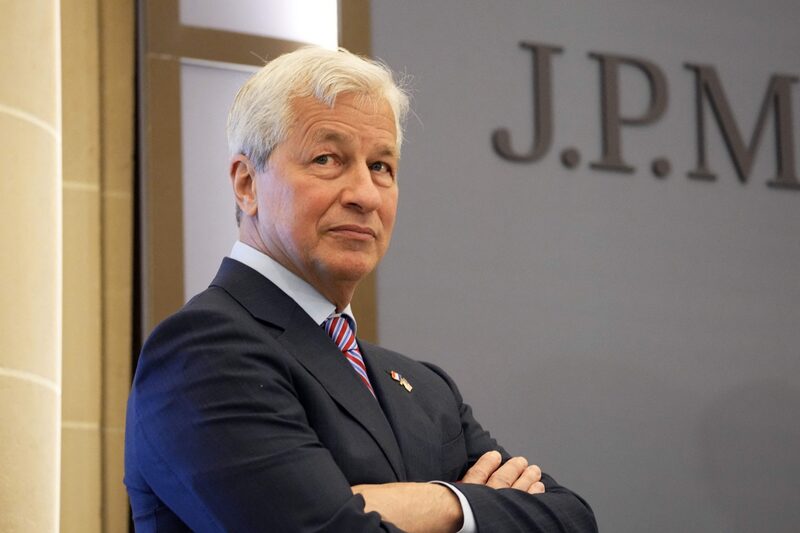Bloomberg — JPMorgan Chase & Co. Chief Executive Officer Jamie Dimon called for ratcheting up sanctions against Russia in response to its invasion of Ukraine and said the Federal Reserve may ultimately raise interest rates more than the market expects.
The U.S. should increase sanctions “in whatever way national security experts recommend to maximize the right outcomes,” Dimon wrote Monday in his annual letter to shareholders. The war and the resulting sanctions “will slow the global economy -- and it could easily get worse.”
The geopolitical upheaval, unleashing an energy crisis that’s exacerbating already surging inflation, has put the central bank in a precarious spot. Rates will rise substantially, and the current tightening cycle “is in no way traditional,” Dimon said.
While the government and the Fed did the right thing by injecting massive liquidity into the financial system in its initial response to the pandemic, in hindsight the monetary support coupled with fiscal stimulus “was probably too much and lasted too long,” he said.
“I do not envy the Fed for what it must do next: The stronger the recovery, the higher the rates that follow,” Dimon wrote. “If the Fed gets it just right, we can have years of growth, and inflation will eventually start to recede. In any event, this process will cause lots of consternation and very volatile markets.”
Challenges Abound
Dimon, 66, took over JPMorgan (JPM) at the end of 2005 and has risen to become the nation’s most prominent and vocal banker, often serving as a spokesperson for the industry. His latest annual letter runs 44 pages, shorter than last year’s 65, and describes “challenges at every turn” -- a marked shift in tone from 2021, when he predicted an economic boom that could endure for years.
The U.S. needs to be prepared for a long war in Ukraine with unpredictable outcomes, Dimon said, adding that while JPMorgan’s direct exposure to Russia is limited, the firm could still lose about $1 billion over time. The biggest U.S. bank, with $3.74 trillion of assets at year-end, is also concerned about the secondary impacts of the sanctions and Russia’s response, he wrote.
Dimon called for a restructuring of trade and supply chains, where national security could be threatened. Higher energy prices highlight the “urgent global need to provide energy resources securely, reliably and affordably,” he wrote.
While long-term clean energy solutions are important, the U.S. should increase energy production and get more liquefied natural gas to Europe “immediately,” he said, noting that these objectives aren’t mutually exclusive.
Bond Payments
JPMorgan and its Wall Street peers have been on the front lines when it comes to enforcing sanctions, as the U.S. and its allies seek to inflict significant financial pain on Russia in response to its invasion. Russia’s continuing sovereign and corporate bond payments have thrust a rare spotlight on the back-office mechanisms that help process trillions of dollars of daily transactions.
“Managing this has been an enormous undertaking,” Dimon wrote. “It is completely different from navigating a financial crisis or a severe recession. This entails sanctioning individuals, including their ownership of assets and companies; reducing exposures across multiple products and services; analyzing and stopping billions of dollars of payments as directed by governments; and many other actions.”
Dimon said his firm is “following both the letter of the law and the spirit of all the American and allied sanctions.” Last month, JPMorgan and rival Goldman Sachs Group Inc. faced criticism from U.S. Senator Elizabeth Warren, a Massachusetts Democrat, after Bloomberg reported that the two banks had been purchasing beaten-down Russian corporate bonds.
The JPMorgan CEO devoted a section of his letter to the firm’s investments and acquisitions. “We hope a few examples will give you comfort in our decision-making process,” he told shareholders.
The bank faced investor pushback earlier this year after executives said they expect expenses to surge 8.6% in 2022. JPMorgan has spent almost $5 billion on acquisitions over the past 18 months and expects most of them to produce positive returns “within a few years,” he wrote.
The economic relationship between the U.S. and China is “critical” to both sides, and trade between them will remain after trade partnerships have been altered, according to Dimon.
China has a “huge interest in making this work,” he said, citing that nation’s $3.6 trillion trade relationship with the West in 2021 as compared to its $150 billion trade relationship with Russia in the same year.
He also said the U.S. should rejoin the Trans-Pacific Partnership.
“We need to look at trade as only one part of strategic economic partnerships -- and that’s exactly what TPP did,” he wrote. “There is a lot at stake, but there is no reason why serious, comprehensive, honest negotiations can’t lead to good outcomes.”
Other highlights from the letter:
- Echoing his warning last year that the banking industry faces competition from every angle, Dimon said “the moats that protect this company are not particularly deep.” He cited Walmart Inc.’s customer reach and Apple Inc.’s expansion into more banking-like products as examples of the threats, and predicted “many mergers” among the more than 4,000 U.S. banks.
- American household finances remain in “excellent shape,” and most consumers and companies are still flush with cash from the pandemic stimulus. Still, account balances in lower-income households are falling faster and failing to keep pace with inflation.
- A supply chain restructuring will create winners and losers, with Brazil, Canada, Mexico and “friendly” Southeast Asian nations poised to be some of the main beneficiaries.
- JPMorgan expects to reach double-digit market share in its payments business over time, said Dimon, adding that “decentralized finance and blockchain are real, new technologies” and that JPMorgan sees many use cases for blockchain.




